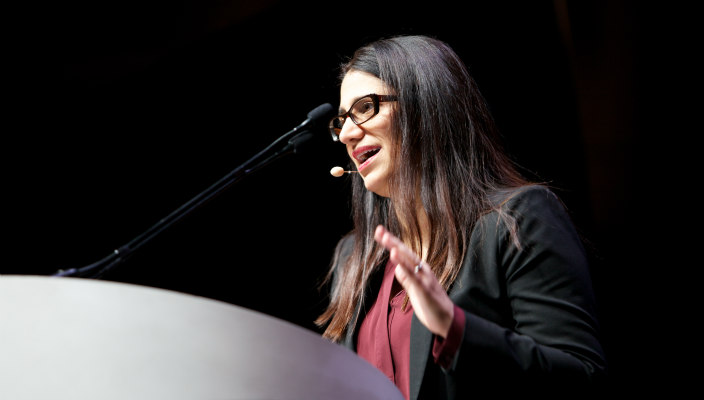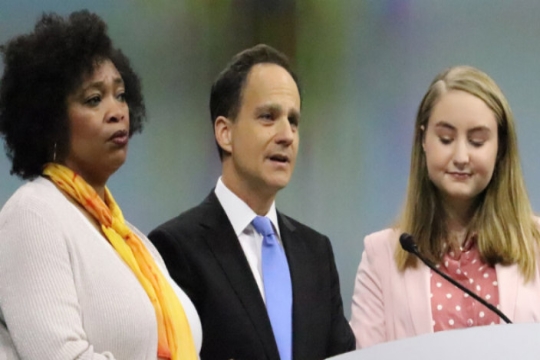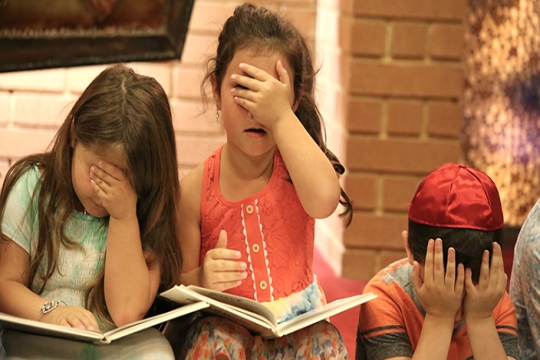
This address was presented before the 74th Union for Reform Judaism Biennial convention on Thursday, December 7, when the URJ presented Dr. Mona Hanna-Attisha with the Eisendrath Bearer of Light Award. You can also download and print a PDF of this speech.
Thank you. I am incredibly humbled to receive the Eisendrath Bearer of Light award and I am so honored to be here with you today.
I want to thank you for giving me the opportunity to share the Flint story and our ongoing fight for clean water and justice.
But before I get there, I would be remiss if I did not share another story. It’s a story that started here in Boston, a story that informs my social justice roots, a story that resonates with our current political reality, and a story that brings us all together.
In the 1930s, my great uncle Nouri Roufeal left Iraq and came here to Boston to study at MIT. And it was here, that he learned how to be an activist, in the tumultuous time after the Great Depression.
He may have done a bit too much rallying and not so much studying, because he lost his scholarship and he had to go back to Iraq.
But that spark – that vision that made him see how the world could be – was lit here and his activism continued back home where he bravely spent his entirely life fighting for justice. He helped write the Iraqi declaration of independence from British rule – perhaps inspired by Boston revolutionaries like Samuel Adams, John Adams, John Hancock and Paul Revere. And, of course, the Boston Tea Party.
In 1937, my uncle Nouri stood up in what was another most dangerous and momentous of times. He was one of two Iraqis who traveled from Baghdad to Spain to fight Franco and the Fascists. He was on the Catalonian front as a member of the International Brigade. But he wasn’t alone. The other brave Iraqi volunteer by his side was Letty Abraham – an Iraqi Jew.
In these strange and mind boggling times that we find ourselves in today - where it seems that we are once again fighting fascists – I think about Nouri and Letty – who together had the courage to stand up and risk their lives fighting for justice - not because it was easy, but because it was the right thing to do. Their stories are part of the fabric of my family history and to this day, their lessons endure.
Stories like these are also part of your family legacy and this larger family. Thank you, URJ, for continuing to stand up for what is right. Your voice and leadership - is desperately important - especially in this most critical hour.
And as an Arab-American, as an immigrant, this recognition and being with you today is incredibly poignant and meaningful. I know we are side by side, as brothers and sisters, in our ongoing struggles for peace and justice – both abroad and here at home – and also in Flint.
By now, most of you are familiar with the Flint’s water crisis. You’ve seen the pictures of brown water coming out of our taps and the moms awkwardly bathing their babies in bottled water, and you know that to this day, the people of Flint are still on bottled and filtered water.
But what I want to share with you today is that the struggle for social justice in Flint started long ago - well before our water crisis. And I want to share that our struggle continues - and it has become a struggle that touches every city and every child. And it is a struggle that we need you to all to be in.
But let’s start by going back to a different Flint.
Over a century ago, Flint did not mean disaster. Flint was the birthplace of General Motors – but more importantly Flint was the birthplace of opportunity.
You may know this story.
It was 1936, and while my uncle Nouri was getting ready to fight fascists in Spain, autoworkers in Flint were fighting for a different kind of justice. For 44 days, they sat down and occupied a series of car plants demanding decent wages and better working conditions.
It took the courage and strength and persistence of the workers, their families and community, and the personal intervention of the Governor of Michigan and President Roosevelt to end the historic sit down strike. And labor won.
Their union, the UAW, was recognized.
For the first time, working people had access to a good life. Living wages, housing, health care, great schools and even a pension.
It’s hard to believe now, but at one point, Flint had the highest per capita income and best public health outcomes in the country. It was hailed as one of the world’s greatest industrial cities, a promised land for generations of workers.
But what followed in Flint, like in many of our manufacturing cities, was decades of crisis - almost every disparity, injustice and inequality you can think of.
Flint was left almost bankrupt, and it was taken over by the state. The state-appointed Emergency Manager’s job was austerity, to save money, no matter the cost.
And in 2014, he severed a half-a-century relationship with fresh, great lakes pre-treated water and instead, started drawing water from the local Flint River. But the Flint River water was not treated properly. It was missing an important ingredient called corrosion control.
The heroic people of Flint raised their voices, and they raised their jugs of brown water. But this poor, predominantly minority city had lost democracy and those voices were ignored. For 18 months they were told to relax, that nothing was wrong, while drinking contaminated water.
Even when General Motors stopped using this water because it was corroding engine parts.
Mind you, we were drinking contaminated water in a city that is literally in the middle of the great lakes - the largest source of fresh water in the world.
The corrosive untreated water created a perfect storm for lead to leach out of our plumbing, into our drinking water and into the bodies of our children. Lead is a potent irreversible neurotoxin. It impacts cognition and behavior, how we think and how we act. There is no safe level.
It is an environmental and social injustice, and in Flint, that injustice only widened.
I walked out of my clinic, and I stood up with research that the untreated Flint River water was poisoning our children.
The State of Michigan tried to discredit me and my science just as they had discredited the people of Flint, the moms, activists, the journalists, the pastors and the scientists.
They said I was an “unfortunate researcher” - and that I was causing “hysteria.”
But you don’t mess around with kids and you don’t mess around with lead.
We were fighting for the future that lives and grows inside our children.
We were loud, stubborn and persistent. And at times, I admit, I was scared, and it was hard, and there was a knot in my stomach that wouldn’t go away.
But this fight wasn’t about me, it was about my kids.
The kids that I took an oath to protect.
As a pediatrician it’s my job to make sure my kids are healthy today, but more importantly that they have the brightest future possible. And what was happening in the water was threatening the tomorrow of all of our kids.
We kept fighting back. And, finally the truth of our science spoke truth to power.
Truth that could no longer be ignored.
And from that moment, my focus went back to my kids in Flint.
And suddenly, my every day took a turn from holding one tiny hand at a time to holding the hands of an entire population of children.
Just as the people of Flint banded together 80 years ago to demand economic justice, we have once again come together, with incredible resilience and pride, to demand justice for our kids.
We are doing something that hasn’t been done before - we are building a model public health program to best preserve the tomorrows of our children. Wrapping our children with science-based interventions that promote their development - home visiting, early literacy, universal preschool, school health, nutrition, health care and more. These are things that ALL children need, especially our youngest and most vulnerable.
We have borrowed a line from Frederick Douglass (as you may know was recently reborn), over 150 years ago said, “It’s easier to build strong children than to repair broken men.” In a city known for building strong cars, we are also now building strong kids.
But this is not enough. And this is where Flint’s struggle is all of our struggle.
Because there are Flints everywhere. From the rust belt, to rural America, to the coasts; black, brown and white - too many of our nation’s children are waking up to the same nightmare - the nightmare of poverty, injustice and lost democracy.
We can do better than this. We must do better than this.
So as a country, as a society, as a movement, as a civilization, as a resistance - as humanists - we must all work towards equality and justice and opportunity for all our children.
But it will take all of us to be brave and to speak up.
In 1967 MLK gave a speech where he said he couldn’t be silenced about the Vietnam War.
He was a dozen years into standing up in the fight for civil rights. But he also believed the Vietnam War was wrong. He was warned that fighting against the Vietnam War was one step too far, that he would lose the allies he needed in the civil rights fight.
He said dissent isn’t disloyalty. He said “the hottest places in hell are reserved for those who in a period of moral crisis maintain their neutrality.”
While he wasn’t the first person to have this thought, it was important coming from him. Think about that. Twenty years after the Holocaust and the brutality of World War II, MLK said that the hottest places in hell, are not for the mass murderers, or the tyrants. It is for those of us who do not raise our voices against injustice.
For those who go with the flow.
Now, today, this message is ever so important. I know you know these lessons, but they bear repeating for us and for those not in this room.
Do not fear being the dissenter, whether fighting big or small injustices.
Stand up.
Tell the other side of the story.
Look out for the forgotten, the displaced, the marginalized.
Never be just be a cog in a wheel.
This call to arms today is not the same as the one that inspired 35,000 freedom loving people, like Nouri and Letty, to travel so far to defend the Spanish Republic, but there is a lot of work ahead of us on so many fronts, and for our children, and this fight is the great unfinished business in our ongoing struggle for social justice.
And I hope that while we are all here in Boston, a birthplace of United States independence and resistance, we – together, hand in hand, my brothers and sisters – commit to fighting for a just and equitable and prosperous future that includes my Flint kids – and kids everywhere.
Thank you.
Dr. Mona Hanna-Attisha is associate professor of pediatrics at Michigan State University College of Human Medicine and director of the pediatric residency program at Hurley Children’s Hospital in Flint, MI. She received her Bachelors and Master of Public Health degrees from the University of Michigan and her medical degree from Michigan State University College of Human Medicine. She directs the Michigan State University and Hurley Children’s Hospital Pediatric Public Health Initiative, an innovative and model public health program to research, monitor and mitigate the impact of lead in Flint’s drinking water. Dr. Hanna-Attisha was recently heralded internationally for her study that exposed elevated lead blood levels in Flint children, and she was recognized as one of Time Magazine’s 100 Most Influential People in 2016.
Have something to say about this post? Join the conversation in The Tent, the social network for congregational leaders of the Reform Movement. You can also tweet us or tell us how you feel on Facebook.
Related Posts

The Shalom Collaboration: How Performing at the URJ Biennial Changed Our Career Trajectory

"What Will You Do at Such a Time as This?"
